There is no denying that cyber hacking happens daily, and dentists should not think that they are an exemption. Healthcare services including dental practices are prime targets for hackers. In fact, small businesses containing health information are targeted quite often.
Data breaches are a major threat to healthcare providers, especially dentists; they are becoming targets for cybercriminals more and more frequently. Health organizations make up roughly 33% of all data security breaches across all industries. It has been shown, however, that a majority of personal health information data breaches has been a result of human error from healthcare employees.
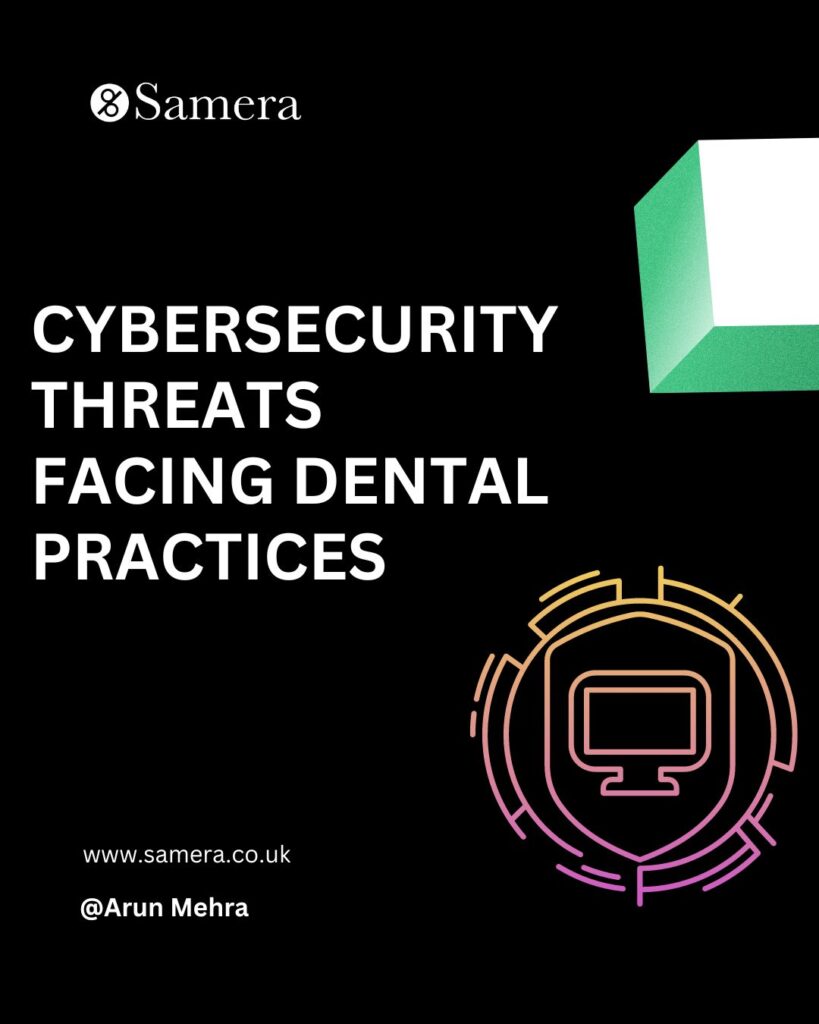
Please click here to read our 10 essential cybersecurity steps for dentists to find out how to protect your dental practice online.
Common Cyber Security Threats
In this webinar, Arun and George take a look at the different cyber security threats facing dental practices, cyber security strategies for dentists and how to respond when your practice is attacked online.
Why are Dental Practices at Risk From Cybersecurity Threats?
Dental practices are becoming hot targets for these cyber criminals because dental offices hold vast amounts of personal data. Not only confidential personal information of your patients such as birthdates, addresses and full names, but also hundreds, if not thousands, of instances of banking information. Hackers also like to target the smaller healthcare businesses because they believe small businesses do not have the resources for sophisticated security measures and they will, therefore, be easier targets.
The threat of this confidential information being stolen is great and dental practice owners must address this concern as soon as they possibly can before a theft occurs and creates a legal nightmare for your business.
You must ensure that your dental practice has the proper IT solutions and cybersecurity procedures in place to adhere to the relevant guidance and regulations.
Action Point
Implement robust IT solutions and cybersecurity measures to protect patient data and comply with regulations.
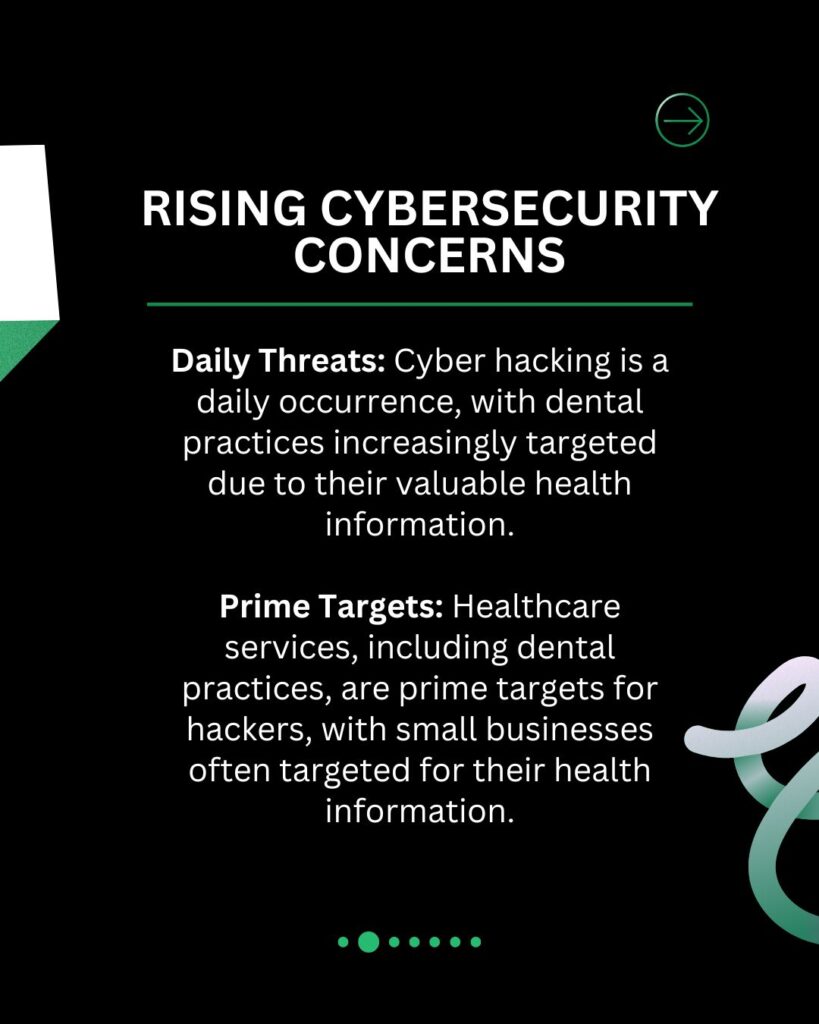
The Need for Cybersecurity in Your Dental Practice
The biggest mistake many dental practices are making is that they believe cyber criminals are not a threat to their small dental practices. However,
The increase of cyber criminals targeting healthcare businesses leaves your dental practice at risk. This is evident through the following statistics:
- The healthcare industry accounts for 43% of all data security breaches
- 47% of all cyber security attacks target small businesses like independent private dental practices
- Since September 2009, almost 21,000,000 health records have been compromised
Many hackers target smaller practices because they assume small businesses do not have the necessary security software of firewalls in place to protect it in place. Unfortunately, in many instances they are right.
Your dental practice is a wealth of patient data which means it is necessary for you to take the proper cybersecurity precautions to make sure that you are adhering to the proper regulations and your patient’s data do not fall into the wrong hands.
Action Point
Implement cybersecurity precautions to protect patient data and adhere to regulations, safeguarding against the high risk of cyber attacks targeting healthcare businesses.
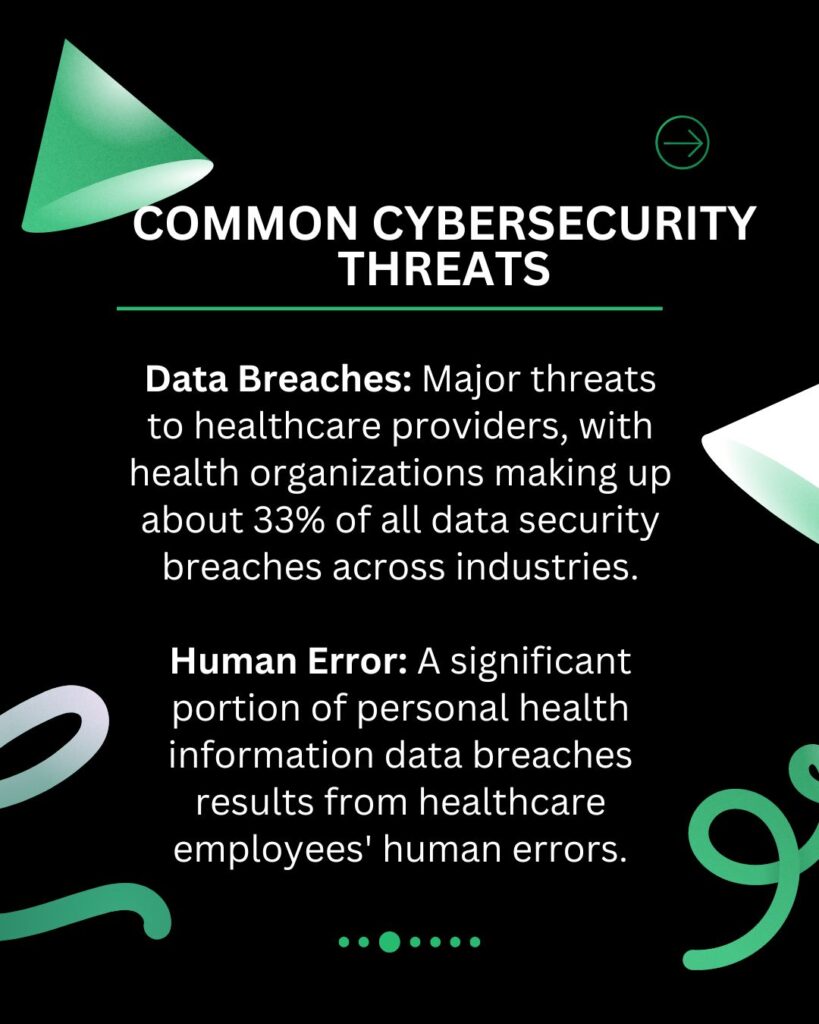
Contact us to find out more
Moving Forward Digitally
Within the last couple years, dental practices have taken a major step in digitising their entire business and using the internet to centralise patient data and improve patient care.
Storing patient information in the cloud has its benefits:
- Accessible any time from any location
- Automatic backup
- Patient data can easily and securely share between different practices
If proper precautions are not taken, dental practices are very vulnerable to security threats and data breaches.
When these breaches happen, confidential patient data can be sold on the DarkWeb resulting in fraud, identity theft and possibly blackmail and other criminal activities. Hackers can also hack your systems and access your own personal company data. Believe us, nothing good will ever come from that. Extortion, blackmail…. It is not pretty.
Action Point
Implement robust cybersecurity measures for cloud-stored patient data to prevent breaches and protect against fraud, identity theft, and other cyber threats.
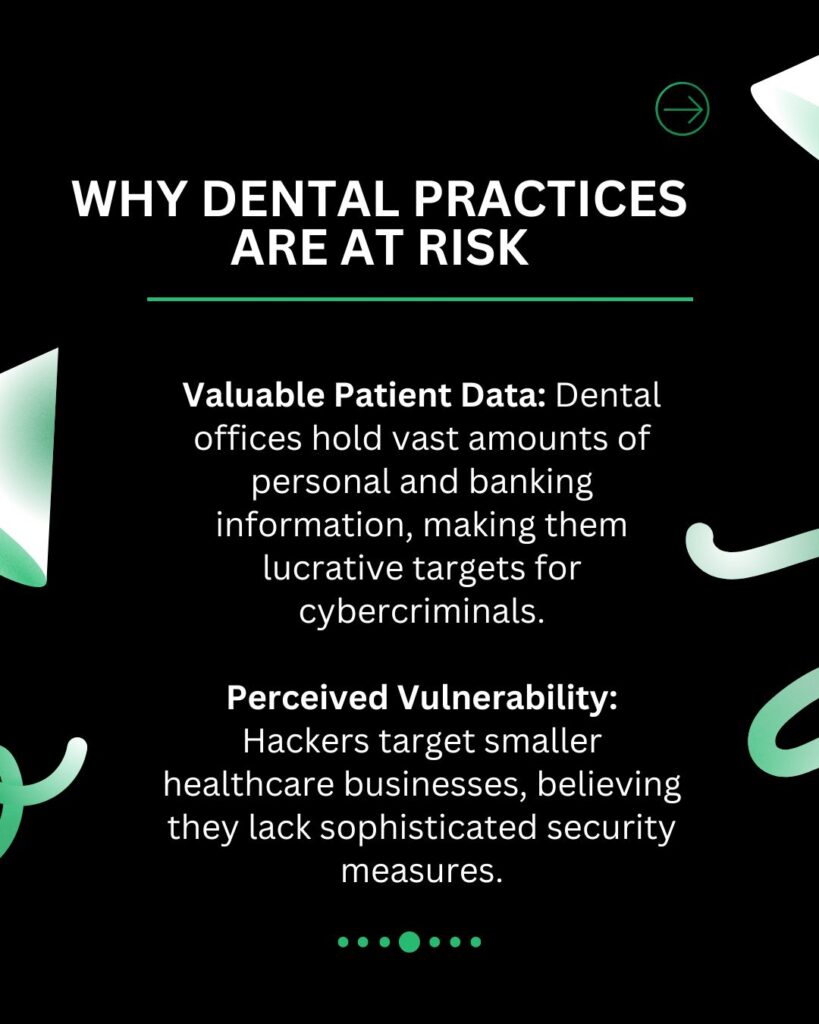
You can learn more about patient data and recording keeping on the BDA website here.
Consequences
If your dental practice gets hacked in any way, the consequences for your dental practice will not only cost you time and money but also potential lawsuits from patients, loss of important data that may not be able to get recovered and brand and reputation damage.
At the end of the day, it is you who will be on the line for any potential data breaches.
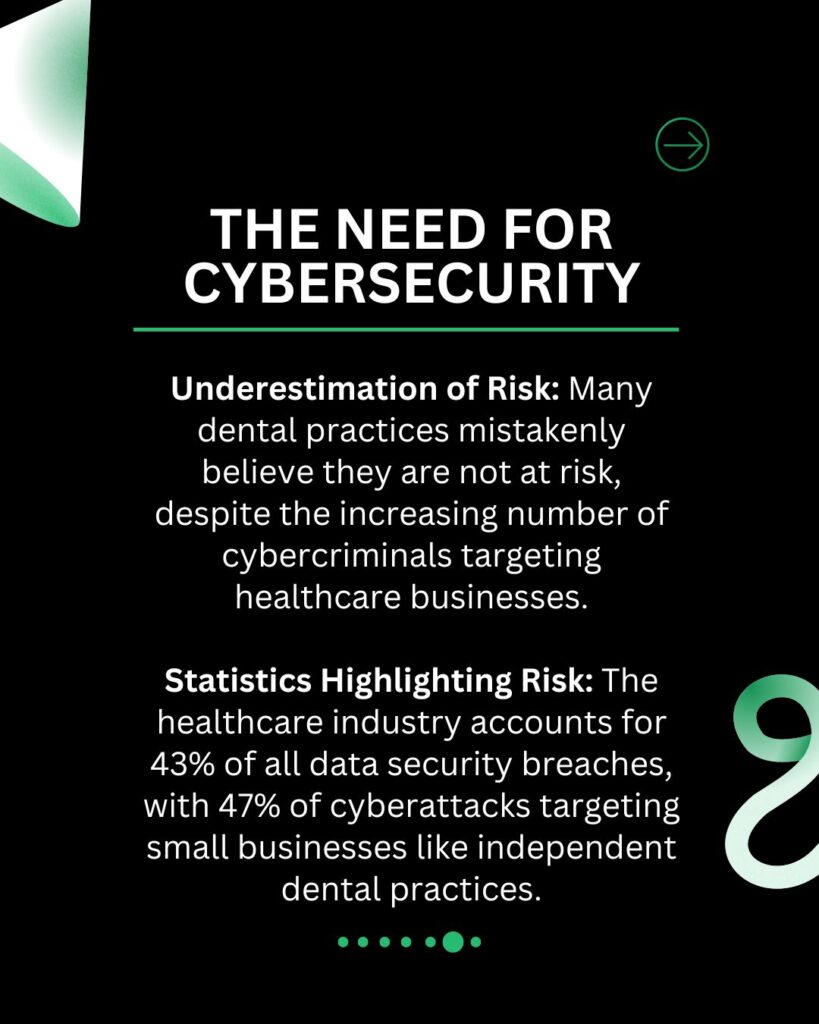
Implement Security Features
Every dental practice should have a policy in place safeguarding patient information and all staff members should be educated about how to comply with the office policy.
We advise a strict internet and computer policy that not only educated your employees when a breach does occur but also deters any mishaps from occurring. This policy enforced should include prohibiting staff members from checking personal email accounts or visiting any internet websites that are not work related.
When accessing any office data remotely, any employees at your dental practice should only use trusted Wi-Fi hot spots and never used shared computers or unsecure Wi-Fi spots. Any smartphones or tablets you have in your practice should be password protected to prevent access to patient information in case that device is lost or stolen.
Antivirus software should be installed on every computer in your practice and left kept updated and checked regularly. In addition, it is also important for dentists to make sure that all operating systems, hardware, software, and firewalls are up to date, secure and strong and that wireless networks are shielded from public view. All hard copies of documents with patient information should be shredded as soon as they are no longer of any use to your practice.
To avoid any type of security breaches there are a few IT solutions you need to implement and ensure are in place to prevent any security breaches as soon as they occur. Here are a few:
- Set up VPN (virtual private network)
- Install anti-virus software for all your devices in your practice
- Automate the encryption of your production
- Backup hard drives with appropriate security hardware
- Always keep your web browsers, software and operating systems updated
- Encrypt data transmitted to anywhere outside the practice
Action Point
Implement strict internet and computer use policies, educate staff, ensure secure remote access, password-protect devices, maintain updated antivirus software, and encrypt and back up data for comprehensive cybersecurity in your dental practice.
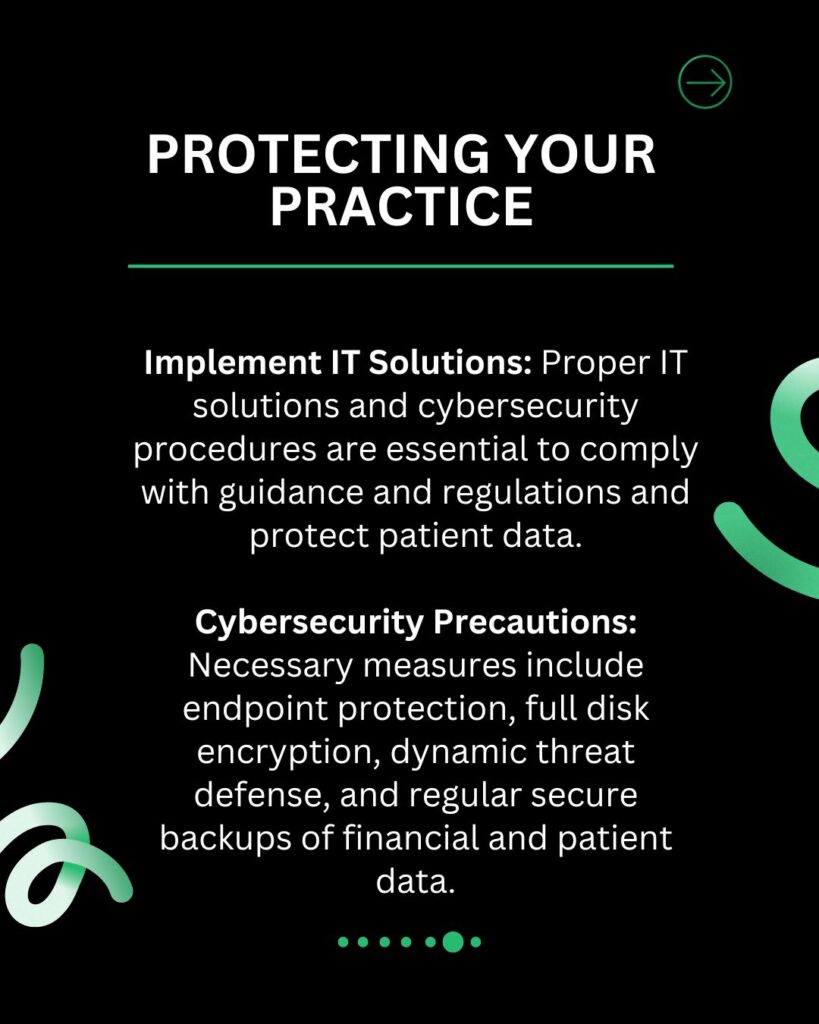
Mitigating Security Risks
Unfortunately, data has shown that even when you have the necessary security measures in place, human error is commonly the sole cause of data breaches. This means that the actions of healthcare employees are unintentionally the cause of three times as many breaches as external attacks on your dental practice.
Without adequate training, your employees could unintentionally be putting your entire practice at risk. This is why, after you have put all the necessary security measures in place, your next priority should be to train your employees to mitigate any security risks.
Here are a few tips for this:
- Avoid disclosing private information over the phone or email. Instead, you should use encrypted communication methods such as encrypted email to protect sensitive patient or employee data
- Set user permission for different roles
- Educate and train staff of latest cyber threats and your latest technological updates
- Choose strong passwords and do not use the same password for everything
- Outline a response plan so the team knows what to do immediately in the event of an attack
- Discourage joining public or unsecured Wi-Fi networks
- Restrict access to personal email accounts and any non-work-related websites
- Require password for any devices you use at the practice, in case it gets lost or stolen
If a security breach in your office does occur, it is absolutely imperative that if a breach in your office does occur, you need to take the appropriate action immediately. This includes determining how the breach occurred to begin with and the extent of the breach. You need to be careful who you initially contact when something like this occurs.
Action Point
Prioritize employee cybersecurity training, use encrypted communication, set user permissions, educate on cyber threats, choose strong passwords, outline a response plan, restrict access to unsecured networks and non-work sites, and password-protect devices to mitigate security risks in dental practices.
Samera helps you stay fully compliant with any security regulations. Our specialists ensure that your dental practice software is always updated, and your data is encrypted with password protection and able to be transferred securely.
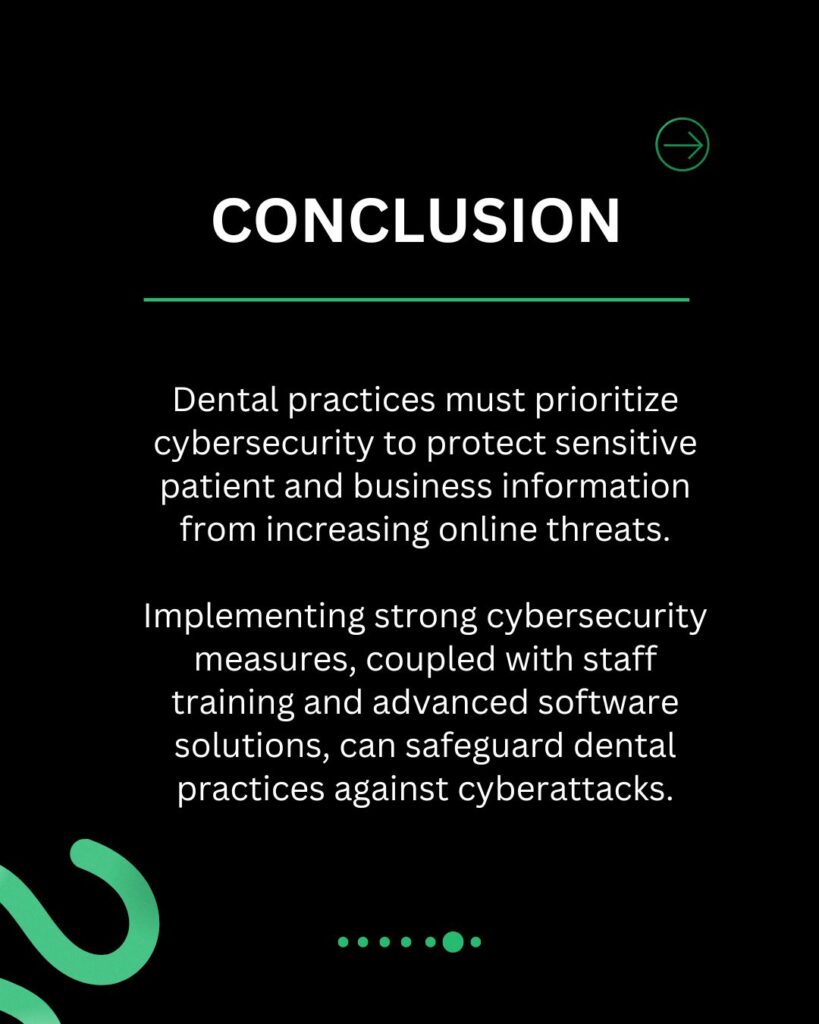
Cyber Security Threats for Dental Practices FAQ
What are the main cybersecurity threats for dental practices?
Dental practices face various cybersecurity threats, including ransomware, phishing attacks, data breaches, malware, and insider threats, all of which can compromise sensitive patient data.
Why are dental practices targeted by cybercriminals?
Dental practices are targeted by cybercriminals because they store valuable and sensitive data, such as personal identification, medical histories, and financial information. This data is highly sought after by hackers for identity theft, blackmail, and ransomware attacks. Additionally, many dental practices may have weaker cybersecurity defenses compared to larger organizations, making them easier targets for cyberattacks.
How can dental practices prevent ransomware attacks?
Dental practices can prevent ransomware attacks by implementing several key cybersecurity measures:
- Regularly Update Software: Ensure that all systems, including dental practice management software, are up to date with the latest security patches to fix vulnerabilities.
- Use Strong Passwords: Enforce the use of complex passwords and multi-factor authentication (MFA) to prevent unauthorized access.
- Install Firewalls and Antivirus Software: Use robust firewalls and antivirus solutions to detect and block ransomware before it can infect the system.
- Data Backup: Regularly back up important data and store it offline or in the cloud. This ensures quick recovery in case of an attack.
- Staff Training: Educate staff on recognising phishing emails, suspicious links, and other social engineering tactics that could introduce ransomware into the system.
- Restrict Access: Limit access to sensitive data and systems to only authorized personnel, reducing the risk of insider threats or accidental infections.
By following these steps, dental practices can reduce their vulnerability to ransomware attacks and protect patient data.
How can dental practices prevent ransomware attacks?
Dental practices can prevent ransomware attacks by taking several proactive cybersecurity measures:
- Keep Software Updated: Regularly update all software, including dental management systems, to patch vulnerabilities that cybercriminals could exploit.
- Use Strong Passwords and Multi-Factor Authentication (MFA): Ensure that staff use strong, unique passwords and enable MFA for an added layer of security.
- Install Firewalls and Antivirus Programs: Use reliable firewalls and antivirus software to detect and block ransomware threats before they can infiltrate your system.
- Regular Data Backups: Perform regular backups of patient and practice data, storing them securely offline or in the cloud, to ensure quick recovery after an attack.
- Train Staff on Phishing Prevention: Educate your team to recognize phishing emails, suspicious links, and other forms of social engineering that often lead to ransomware infections.
- Limit User Access: Restrict access to sensitive systems and data only to authorized personnel, reducing the risk of internal or accidental infections.
Implementing these best practices helps dental practices reduce the risk of ransomware attacks and keep patient data safe.
What is phishing, and how does it affect dental practices?
Phishing is a type of cyberattack where attackers pose as legitimate entities to trick individuals into revealing sensitive information, such as passwords, credit card numbers, or access credentials. This is usually done through deceptive emails, messages, or websites.
- How Phishing Affects Dental Practices:
- Data Breaches: If staff fall for a phishing scam, it can lead to unauthorised access to patient records, compromising sensitive personal and medical data.
- Financial Loss: Phishing attacks can result in fraudulent transactions or theft of financial information, leading to direct financial losses for the practice.
- Ransomware Infections: Phishing emails often carry malicious attachments or links that can install ransomware, locking dental practice systems until a ransom is paid.
- Reputation Damage: A data breach or ransomware attack can damage the trust patients have in the dental practice, harming its reputation and potentially leading to patient loss.
- Legal and Regulatory Penalties: A phishing-induced data breach may result in non-compliance with privacy regulations like GDPR, leading to fines and legal consequences.
By training staff to recognize phishing attempts and implementing security measures, dental practices can protect themselves from phishing attacks.
How do data breaches impact dental practices?
Data breaches can have severe and far-reaching impacts on dental practices, affecting them in several ways:
- Patient Data Exposure: Sensitive patient information, such as personal details, medical records, and financial data, can be exposed or stolen, leading to identity theft or misuse of medical records.
- Financial Loss: Dental practices may face direct financial losses from legal fees, fines, and costs to repair the breach. They may also lose revenue if operations are disrupted during or after the breach.
- Reputation Damage: A data breach can significantly harm the practice’s reputation, eroding patient trust. Patients may choose to switch to other practices due to concerns over the security of their personal information.
- Legal and Regulatory Penalties: Non-compliance with data protection laws like GDPR or HIPAA (for U.S. practices) can result in hefty fines and legal consequences if a breach occurs and patient privacy is compromised.
- Operational Disruption: Data breaches often lead to downtime as IT systems are shut down to contain the breach, disrupting daily operations and leading to lost productivity and appointments.
By implementing robust cybersecurity measures and regularly training staff, dental practices can reduce the risk of data breaches and protect their patients and business.
What steps can dental practices take to protect patient data?
Dental practices can take several steps to protect patient data and ensure compliance with data protection regulations like GDPR. Here’s how:
- Use Encryption: Encrypt all sensitive patient data, both in storage and during transmission, to prevent unauthorized access.
- Strong Passwords and Multi-Factor Authentication (MFA): Implement strong password policies and use MFA for access to sensitive systems, ensuring an additional layer of security.
- Regular Data Backups: Schedule frequent backups of patient data, storing them securely offline or in the cloud, to ensure recovery in case of a breach or system failure.
- Secure Networks: Use firewalls, antivirus software, and secure Wi-Fi networks to protect against external cyberattacks and unauthorized access.
- Limit Access to Data: Restrict access to patient data to only authorized personnel, ensuring that not all staff have access to sensitive information unless necessary.
- Staff Training: Provide regular training to staff on cybersecurity best practices, including recognizing phishing scams and using secure communication methods.
- Monitor for Unusual Activity: Implement monitoring systems to detect and alert you of any unusual access or suspicious activities that could indicate a potential breach.
- Secure Communication Tools: Use encrypted communication platforms and patient portals for sharing sensitive information with patients securely.
By following these steps, dental practices can significantly reduce the risk of data breaches and protect patient data effectively.
How can dental practices defend against malware?
Defend against malware by installing and updating antivirus software, avoiding suspicious downloads, using secure networks, and regularly scanning systems for vulnerabilities.
What should dental practices do in the event of a cyberattack?
In the event of a cyberattack, dental practices should take immediate action to mitigate the damage and protect patient data. Here’s what to do:
- Isolate Affected Systems: Disconnect compromised computers and networks from the internet to contain the attack and prevent it from spreading to other systems.
- Notify IT Professionals: Contact your IT support team or cybersecurity experts to assess the situation, contain the breach, and begin the recovery process.
- Report the Breach: If sensitive patient data is compromised, notify relevant authorities such as the Information Commissioner’s Office (ICO) in the UK or HIPAA in the U.S. within the required time frame (e.g., 72 hours for GDPR).
- Inform Patients: If patient data is involved, inform affected patients about the breach, its potential impact, and the steps being taken to protect their information.
- Assess the Damage: Work with your IT team to determine the extent of the damage and whether any data has been lost, stolen, or encrypted (as in a ransomware attack).
- Restore Data from Backups: Use recent, secure backups to restore affected systems and data if needed, ensuring that the backup itself was not compromised.
- Strengthen Security Measures: Review and improve your cybersecurity protocols, such as updating software, changing passwords, and implementing stricter access controls to prevent future attacks.
- Document the Incident: Keep detailed records of the cyberattack, the steps taken to address it, and any communications with authorities and patients for legal and regulatory purposes.
By responding quickly and following these steps, dental practices can reduce the impact of a cyberattack and protect patient trust.
How does insider threat affect dental practices?
An insider threat involves staff members, either intentionally or accidentally, exposing sensitive data. It can be minimized through staff training, strict access controls, and monitoring systems.
Why is cybersecurity important for dental practices?
Cybersecurity is essential for dental practices to protect patient data, maintain trust, comply with legal regulations like GDPR, and prevent costly disruptions caused by cyberattacks.
How can dental practices secure online communications with patients?
Use encrypted communication platforms, secure email services, and patient portals to ensure that all online communications involving sensitive patient data are protected.
What are the consequences of ignoring cybersecurity threats in a dental practice?
Ignoring cybersecurity threats in a dental practice can lead to several serious consequences:
- Data Breaches: Failing to address cybersecurity risks can result in the exposure of sensitive patient information, such as personal details, medical histories, and financial data, leading to identity theft or misuse.
- Financial Losses: Cyberattacks can lead to direct financial costs, including fines for non-compliance with regulations like GDPR or HIPAA, legal fees, and the expense of recovering from a breach.
- Reputation Damage: Patients trust dental practices to protect their personal information. A data breach or cyberattack can erode that trust, damaging the practice’s reputation and potentially causing patients to leave.
- Operational Disruptions: Cyberattacks like ransomware can disrupt operations by shutting down access to essential systems, leading to lost revenue and productivity while the issue is resolved.
- Legal and Regulatory Penalties: Dental practices are legally required to protect patient data. Ignoring cybersecurity threats can result in non-compliance with privacy laws, leading to hefty fines and legal consequences.
- Patient Loss: Breaches can cause patients to lose confidence in the practice’s ability to secure their data, leading to a decline in patient retention and fewer new patient referrals.
By addressing cybersecurity threats proactively, dental practices can avoid these consequences and ensure the safety of their patients’ data and their own business operations.
How can dental practices train staff to avoid cybersecurity threats?
Regular staff training is key. Teach employees how to identify phishing emails, create secure passwords, follow data protection protocols, and avoid suspicious links or downloads.
What is the role of encryption in protecting dental practice data?
Encryption ensures that sensitive patient data is unreadable to unauthorized users, both when stored and during transmission, providing a critical layer of protection against data breaches.
What legal obligations do dental practices have regarding cybersecurity?
Dental practices are legally required to protect patient data under regulations like GDPR. This includes implementing adequate cybersecurity measures and reporting data breaches within 72 hours.
Learn more: Related Articles
About the Author

Chris O’Shea
With nearly 10 years experience in marketing and communications, Chris is the Head of Marketing at the Samera Group.
Chris oversees all of our marketing efforts for Samera Global, Samera UK and our dental practices.
He specialises in search engine optimisation, getting to the top of Google and content marketing strategy.
Reviewed By:
Arun Mehra
Samera CEO
Arun, CEO of Samera, is an experienced accountant and dental practice owner. He specialises in accountancy, financial directorship, squat practices and practice management.
Get Started: Cyber Security for Healthcare
Cyber security is an essential part of keeping your patients, data and business protected online.
With Samera Cyber Security, you get the tools you need, the know-how to use them and digital copies of all your data. This three-pronged approach means you can keep your business safe and your data safe.
Contact us today to find out more about how our cyber security training, digital protection products and back-up contingencies can help you.
Make sure you never miss any of our articles, webinars, videos or events by following us on Facebook, LinkedIn, YouTube and Instagram.




